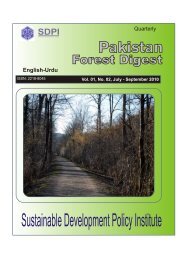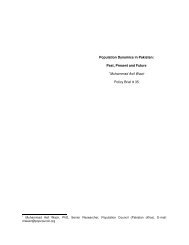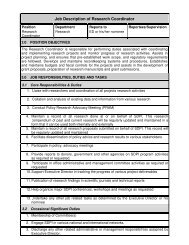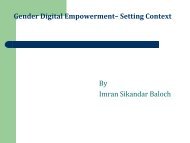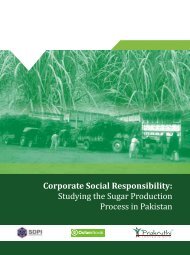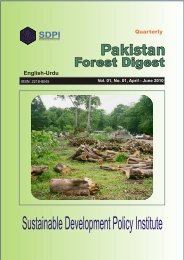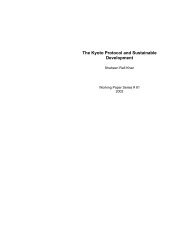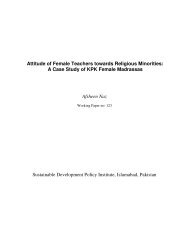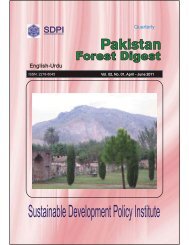Annual Report 2009-10 - Sustainable Development Policy Institute
Annual Report 2009-10 - Sustainable Development Policy Institute
Annual Report 2009-10 - Sustainable Development Policy Institute
- No tags were found...
You also want an ePaper? Increase the reach of your titles
YUMPU automatically turns print PDFs into web optimized ePapers that Google loves.
<strong>Annual</strong> <strong>Report</strong><strong>2009</strong> - 20<strong>10</strong>Primary Data CollectionSDPI has created its niche in conducting third party monitoring & evaluation as well as processreview assignments pertaining to development interventions of various national and internationaldevelopment agencies. It also carries out baseline surveys enabling development partners toinitiate their interventions on a true knowledge base. SDPI has arrangements to collect primarydata at village, union council, tehsil & district level across Pakistan. Our M & E team is highlyspecialized in formulating data collection instruments. A team of analysts and statisticians areable to develop a customized database for efficient data analysis. During 20<strong>10</strong>, we carried out M& E & process review assignments for the World Food Program, FAO, WHO, ILO, RSPN,SRSO, SRSP, Trans International Crisis Project & University of Zurich. Details of some of theassignments are as follows:Child LabourBaseline Survey on Children in the Worst Forms of Child Labour in the District Sahiwal(Punjab)There is no comprehensive information on children involved in the worst forms of child labour(WFCL) in the district of Sahiwal (Punjab). A project has therefore been designed for this purposewith the technical support of the International Labour Organization (ILO) and the FederalBureau of Statistics (FBS). In this regard, a consensus had been built on the definition of theChild and Child Labour. The data collection exercise was conducted in such a way that the comparabilityof data with government surveys remained integrated. The Federal Bureau of Statistics(FBS) developed the sample design of the survey for rural and urban Sahiwal. The sampledesign provided the complete details of the thirty enumeration clusters. To implement the datacollection exercise, FBS trained key staff members of the SDPI for cluster formation. Fieldworkwas conducted in three phases. The first phase began with the formation of cluster formation inrural and urban Sahiwal. The second phase administered the screening questionnaire for identificationof child labour. The third phase was completed with the collection of 300 detailed questionnairesin all the sampled clusters. Currently, data entry and the cleaning exercise is in process.The project is expected to be completed by the end of December.Data collection and measurement of the Worst Forms of Child Labour aims to contribute to theempirical knowledge base of the area being studied. The analysis of the baseline data will providerich information on the determinates of the Worst Form of Child Labour in order to improveour understanding of this phenomenon. The BLS is also expected to provide reasonable informationabout the determinates of high drop-out rates for primary schools and the impact of involvementin work and/or domestic chores on the school achievement of children in the selectedhouseholds.Process Review: Sindh Rural Support Organization's Union Council Based Poverty ReductionProgram (UCBPRP)SDPI has been assigned to carry out regular process review (every quarter) of the interventionscarried out by SIndh Rural Support Organisation for Government of Sindh. SRSO has initiated aUCBPRP through which it aims to give income generating grants; small loans; infra structuredevelopment support; low cost housing; micro health insurance and vocational trainings at thevillage level. All interventions are carried out through community mobilization by formingwomen's organizations and the beneficiaries are identified through poverty scorecard rating.A team of qualified professionals conducts the review. The team is deputed according to the linguisticdemands of the area, to focus on the quality and authenticity of information. SDPI organizesa four-day training for field teams with special emphasis on a sound and clear understandingof the tools and tasks. Upon the successful validation of field survey tools in the pre-test, theteams are sent to the designated areas / zones for field implementation in all targeted UCs..39S u s t a I n a b l e D e v e l o p m e n t P o l I c y I n s t I t u t e



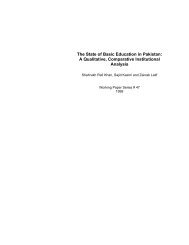
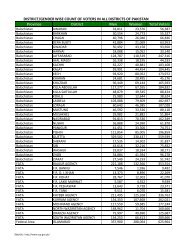
![(October - December, 2010) [13th SDC Special Bulletin]](https://img.yumpu.com/50118608/1/184x260/october-december-2010-13th-sdc-special-bulletin.jpg?quality=85)
